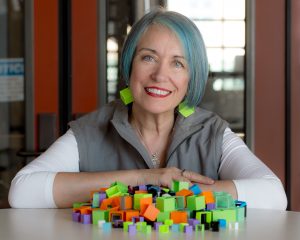March is Women’s History Month in the United States, and as educators we reflect on how to best provide opportunities for our young students to become women in history as they grow and enter the workforce. With women underrepresented in the STEM fields, the focus on creating a broad and equitable approach to STEM education is important beginning at a young age. Research from AAUW indicates that “girls’ achievements and interest in math and science are shaped by the environment around them,” and our community of educators can play a significant role in developing an environment for successful students in STEM. Read the “Why So Few” report by AAUW to learn more about the gender gap in STEM.
Meanwhile, there are lessons to be learned from women in STEM fields today, and I recently sat down with Sarah Boisvert who has made her mark in the laser manufacturing field. She is the founder of Fab Lab Hub and advocates for technical education to pave the way to modern manufacturing jobs, creating opportunities for women and girls in this New Collar Workforce. Her bio can be found below. Here is my conversation with Sarah reflecting on girls in STEM and her own journey.
How did you get started in your career?
I was always good in math and science, and though I studied piano performance at Julliard, I eventually ended up with an MBA in market segmentation strategy. I met a laser physics Ph.D. and worked with him to take his inventions and turn them into products. I apprenticed in the lab with my business partner for two years learning everything there was to know about laser physics, building parts from scratch since there was no automated machinery to manufacture lasers. Eventually I co-founded the commercial division of Potomac Photonics Inc. and we started doing just that, manufacturing lasers.
Tell me about a challenge you faced as a female professional in this field and how you overcame it.
When I started out, industrial laser manufacturing was 100% a man’s world. At my first CLEO – the Optical Society of America’s Conference on Lasers and Electro-Optics – in 1986 there were 10,000 men and only 5 women. As a woman in this field, I stood out, and I used that to my advantage. Pretty soon everyone in the industry knew me and so would take my calls, and I gained respect by demonstrating my in-depth knowledge, math capabilities, and competence. I gained respect in the industry by being professional, never condescending or arrogant, and becoming a true colleague with all of the men in the field.
What drew you to this field as a young student?
Honestly, I think my music training taught me how to think analytically. Breaking down a piece of music is analytical, how the threads fit together like the harmony and melody and rhythm. Lots of scientists and engineers are musicians, and there is a correlation between music and math. The reason I can do math so well, and in my head, is from the intellectual challenge of playing the piano. As for science, I was always an avid science fiction reader, my favorite author was Asimov. And, when I was six, the famous President Kennedy moon speech really inspired me to think about the possibilities of science getting us to the moon.
What are some differences you see in the manufacturing field between today and when you got started?
The diversity of the field has changed somewhat since I started my company, and it is really exciting to see people from different backgrounds coming together to solve problems and bringing so much creativity and understanding. Having more perspectives in problem-solving is important, and I notice that having women’s voices at the table brings a more user-based focus to manufacturing. While men are often focused on solving the technology aspect of the problem, women tend to think more about the customer needs and global parameters. When there is opportunity for a diverse group of people to collaborate on a problem, there is so much more creativity.
As educators, what can we do to inspire young girls to pursue a career in STEM?
K-12 programs must give young girls the opportunity to identify and solve problems in their home, classroom, school, and community in order to foster innovation. There is great satisfaction in identifying a problem and then creating a solution, and this is especially important for girls. Through problem-based learning and engineering, empowering the students to innovate their own solutions can really change the learning environment. One of the basic concepts of LEAN manufacturing is empowering people to solve self-identified problems for the benefit of the whole system, and that is true of education as well.

Sarah Boisvert is a co-founder of Potomac Photonics, Inc., Baltimore MD, which invented and manufactured the laser for LASIK eye surgery as well as laser machine tools. She founded Fab Lab Hub, LLC in Santa Fe, NM in 2017 to provide advanced manufacturing contract services, as well as develop workforce training programs. In 2017 Sarah interviewed 200 manufacturing companies to define the digital skills manufacturing operators and technicians need today. The resulting book, The New Collar Workforce, documents the study. Her second book, People of the New Collar Workforce, uses Augmented Reality to bring worker stories to life via embedded video links.
In collaboration with America Makes, the national 3D printing institute, she recently developed a digital badge micro-certification program for 3D Printing technicians. The badges are issued by the New Collar Network, an MIT Fab Lab organization, that she co-founded. From 2018 – 2020 Sarah consulted for the National Governors Association “Future Workforce Now” project to develop a workforce policy toolkit for States. Fab Lab Hub was also granted an additive manufacturing registered apprenticeship by the US Dept. of Labor in 2020.
